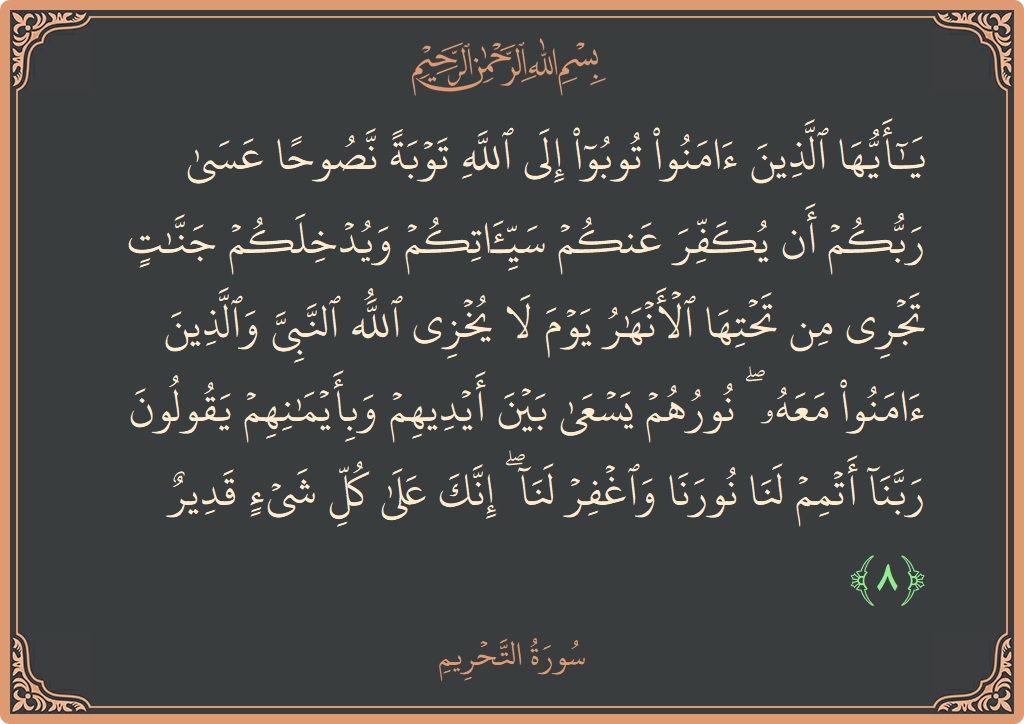Surah At-Tahrim: Verse 8 - يا أيها الذين آمنوا توبوا... - English
Tafsir of Verse 8, Surah At-Tahrim
English Translation
O you who have believed, repent to Allah with sincere repentance. Perhaps your Lord will remove from you your misdeeds and admit you into gardens beneath which rivers flow [on] the Day when Allah will not disgrace the Prophet and those who believed with him. Their light will proceed before them and on their right; they will say, "Our Lord, perfect for us our light and forgive us. Indeed, You are over all things competent."English Transliteration
Ya ayyuha allatheena amanoo tooboo ila Allahi tawbatan nasoohan AAasa rabbukum an yukaffira AAankum sayyiatikum wayudkhilakum jannatin tajree min tahtiha alanharu yawma la yukhzee Allahu alnnabiyya waallatheena amanoo maAAahu nooruhum yasAAa bayna aydeehim wabiaymanihim yaqooloona rabbana atmim lana noorana waighfir lana innaka AAala kulli shayin qadeerunTafsir of Verse 8
Commentary
تُوبُوا إِلَى اللَّـهِ تَوْبَةً نَّصُوحًا (...turn to Allah with a faithful repentance...66:8). The word taubah, literally, means 'to turn' or 'to return', in the sense of turning or withdrawing from sins. In the terminology of the Qur'an and Sunnah, it signifies 'to regret committing sins in the past and to firmly resolve abstaining from them in future'. Taubah is qualified in the verse by the word نصوح nasuh. If it is taken as the infinitive of nasaha / nasihah, it signifies 'to make pure and sincere'; and if it be derived from nasahah, it signifies 'to repair clothes by sewing'. In terms of the first meaning, the expression nasuh signifies sincere/faithful [ repentance ], free from pretence and hypocrisy. In this interpretation, a sinner is required to regret the sins he has committed and give them up purely for the pleasure of Allah and for fear of Divine chastisement. In terms of the second meaning, nasuh would signify that 'the sinner is required to repair the torn clothes of righteous deeds'. Sayyidna Hasan Basri (رح) says that taubatan nasuha signifies that a person should regret his past evil actions, and make a firm resolve never to repeat them. Kalbi says the phrase taubatan nasuha signifies that a person should pray for pardon with his tongue, regret in his heart, and should prevent the limbs of his body from committing sins in the future.
Sayyidna ` Ali ؓ was asked as to what is 'taubah' and he replied that it consists of six elements: [ 1] to regret one's past evil deeds; [ 2] to carry out Divine duties that were missed; [ 3] to restore the rights that were usurped; [ 4] to ask forgiveness of a person who has been wronged by him physically or verbally; [ 5] to make a firm resolve of avoiding the sin in future; and [ 6] to consume one's self in obedience of Allah as one thus far consumed one's self in His disobedience. [ Mazhari ]. In fact, all of the conditions of 'taubah', put forward by Sayyidna ` Ali ؓ ، are recognized by all the scholars. However, some have described them concisely and others in details.
عَسَىٰ رَبُّكُمْ أَن يُكَفِّرَ عَنكُمْ (It is hoped from your Lord that he will write off your faults...66:8). The verb ` asa means 'it is hoped'. In this context, it purports to mean 'promise', but the expression of 'hope' is used to indicate that taubah or any other righteous deeds are not the just and equal price for the Paradise or the divine forgiveness. In fact, one compensation for man's good deeds has already been given to him in this world in the form of worldly blessings. Therefore, as regards the law of equality, it is not necessary that he is further compensated by the Jannah. It entirely depends on Divine grace and favour as is mentioned in a Hadith which says: 'Your actions alone cannot salvage you.' The Companions inquired: '0 Messenger of Allah, not even you?' He replied: 'No, not even me unless the Divine grace and mercy covers me.' [ Bukhari and Muslim as quoted by Mazhari ]
